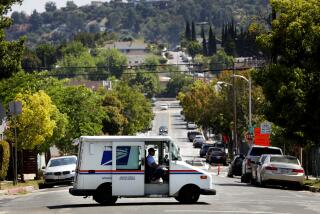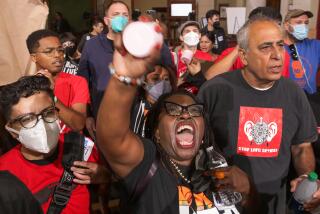Urban League Calls On Reagan to Heal Breach With Blacks, Lists Steps to Take
- Share via
WASHINGTON — The president of the National Urban League called on President Reagan Wednesday to “take a handful of small steps that could begin to heal the breach between his Administration and black people.”
John E. Jacob, in issuing the league’s 10th annual report on “the state of black America,” said that blacks “have been sliding backward in the 1980s” after making important gains in the two previous decades. To help “reverse that trend,” Jacob urged that Reagan:
--Support a civil rights bill to overturn the Supreme Court’s so-called Grove City College decision, which sharply limited the scope of an anti-sex discrimination law and, some fear, could lead to similar court-imposed restrictions on laws banning racial bias.
South African Policy --End the U.S. policy of “constructive engagement,” or quiet diplomacy, toward South Africa’s racially separatist regime.
--Halt “ill-tempered attacks” by Administration officials on black organizations and on “important principles such as affirmative action and desegregation.”
--Strongly support the Administration’s own proposal for enterprise zones, which involves giving tax breaks to businesses that locate in blighted areas.
--Stop pushing for cuts in social programs that help the poor.
--”Open the channel of communication between the White House and black America.”
In expanding on the last point, Jacob said, “This is the first Administration in memory in which government officials have been isolated from voluntary organizations representing America’s poorest citizens. . . . If this Administration can institute ‘a new dialogue’ with Russia, which it has called ‘an evil empire,’ it can institute a new dialogue with that part of America that has time and again proved by its blood, sweat and tears its loyalty to America . . . .”
But Jacob, continuing a theme first sounded by the National Urban League a year ago, emphasized that government alone cannot solve problems afflicting blacks--instead, corporate America and black community groups must lend a bigger hand, he said.
“In past years,” Jacob said, “we made a loud cry for government to take responsibility. But, in the last four years, government has not heeded those calls . . . . What you’re seeing today is the maturing of black America. We believe the government ought to do those things it does well. But the black community admits there are some things we ought to be doing, and we’re prepared to do them.”
The league’s report called for a joint public and private effort to train the unskilled and the unemployed and to retrain displaced workers for jobs in growth industries.
But the league, noting the reality of soaring budget deficits, played down the need for expensive federal jobs programs. It proposed amending the Full Employment Act of 1978 to assist blacks in achieving parity of employment with whites, instead of full employment. Unemployment among whites is now about 6%, much lower than blacks’ 15%.
Less Access to Computers “We are prepared to accept a level of black unemployment that exists for whites,” Jacob said. “We will accept parity unemployment. So, if 6% is acceptable for whites, we’ll accept 6% unemployment for blacks.”
In a study done for the league’s report, UC Berkeley administrator Robert E. Fullilove III found that “computers were far less accessible in predominantly minority elementary schools than in white schools.”
Moreover, Fullilove said, “Black students--and most particularly black males--are not persisting in high school mathematics and have effectively selected themselves out of the technological work force before they have reached their 17th birthday . . . . Blacks can achieve high levels of competence in computing as well as in mathematics. The resources of the nation’s educational institutions must be directed to bringing this about.”
More to Read
Sign up for Essential California
The most important California stories and recommendations in your inbox every morning.
You may occasionally receive promotional content from the Los Angeles Times.










